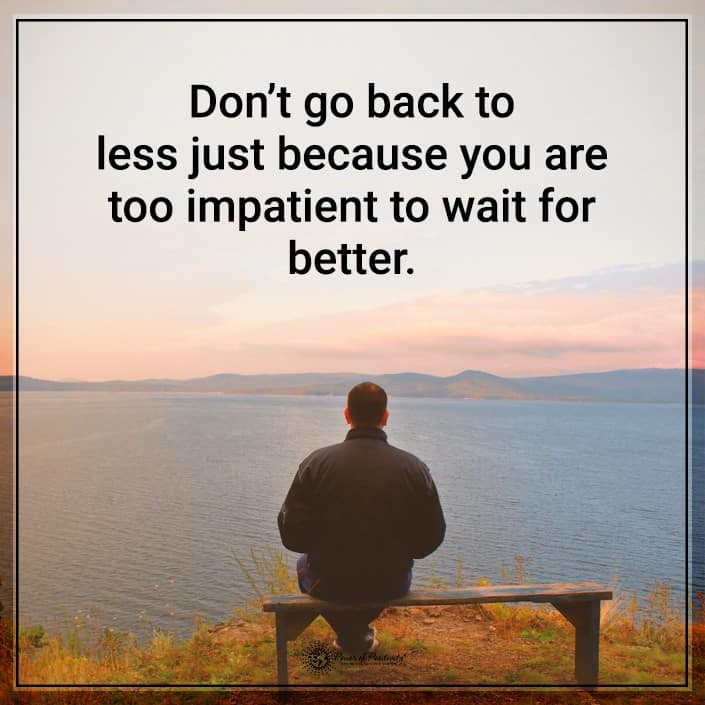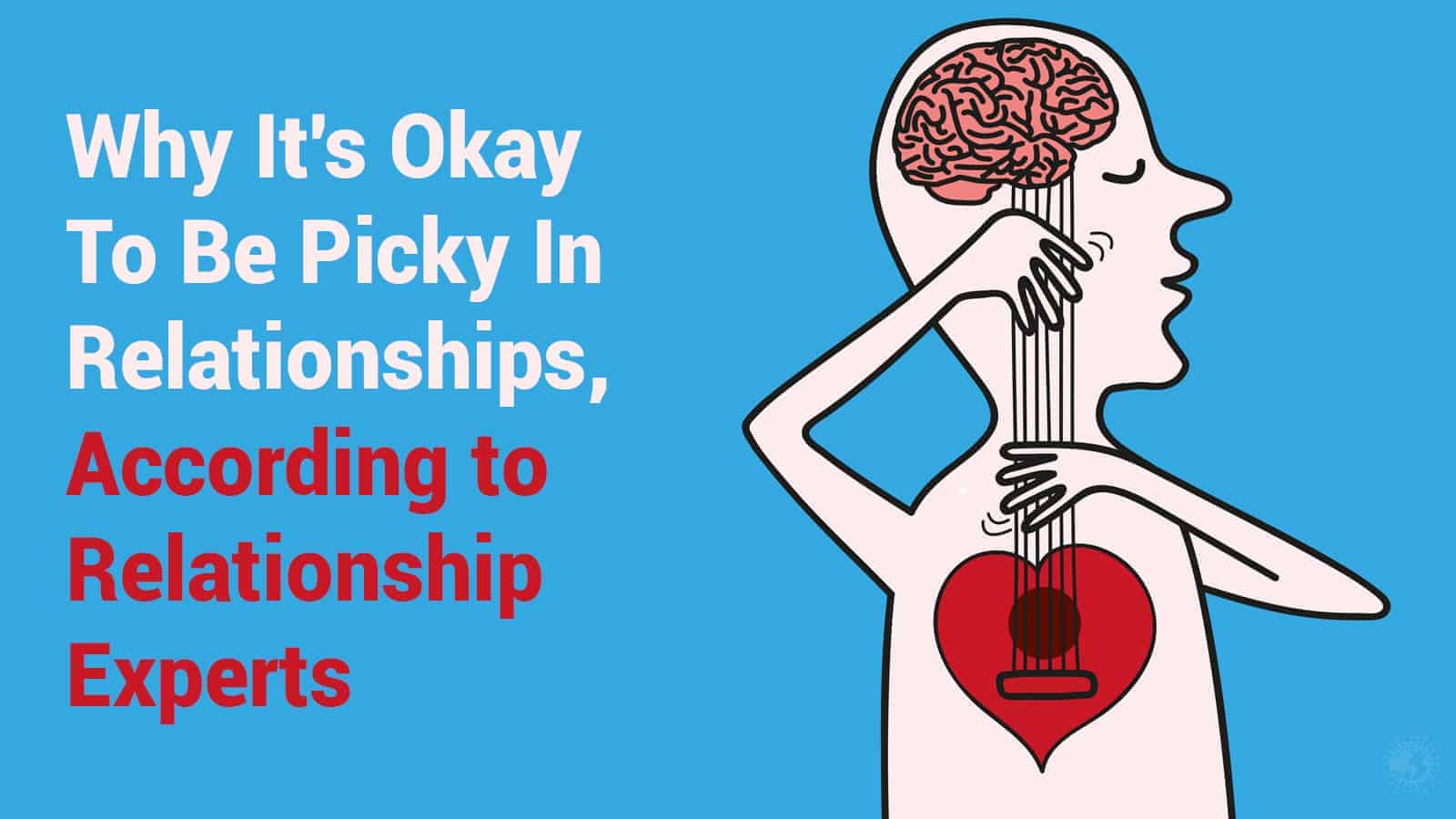Are you currently single? Are you often told that if you just lowered your standards and stopped being picky, you’d have an easier time dating? Do you sometimes feel ashamed for your perceived pickiness?
Keep your chin up and turn on your positive thinking! Being “picky” isn’t actually as bad as you might think. Here’s how experts reveal 8 reasons why it’s okay to be picky in relationships.
1. You Have To Focus On The Long-Term Facts
 If all you’re interested in is a fling, sure, you don’t have to be picky. But if you’re seeking long-term relationships with the end-goal of a life partnership, then long-term thinking is crucial. This means being significantly pickier when it comes to the people you choose to date.
If all you’re interested in is a fling, sure, you don’t have to be picky. But if you’re seeking long-term relationships with the end-goal of a life partnership, then long-term thinking is crucial. This means being significantly pickier when it comes to the people you choose to date.
Licensed Clinical Social Worker and psychotherapist Leah Aguirre states that although living in the present is important for healthy relationships, you need to still think of the big picture. Long-term implications exist in all relationships, and if you want to go the distance, you need to prepare for them.
In other words, chemistry and connection may not be enough to carry you all the way to a together-forever situation. Differing expectations, future desires, and general compatibility issues can cause long-term plans to fall apart. You have to think about if you share these common things:
- You both want children, and if so, if they would be a good parent
- Both will be supportive of your personal choices and career path
- You both have similar visions for the future
- You can both be happy with each other for the rest of your lives, or as long as possible
- Both partners have the ability to compromise, communicate, and be accepting of each other
Being picky allows you to weed out prospective partners with who you may not be able to truly go the distance. It saves you time and heartache in the long run.
2. Little Things You Overlook Now May Bother You Later On
Minor quirks from a partner should be things that endear you to them. Finding tiny little personal traits of theirs annoying is a surefire way to wind up in a contemptible and negative relationship.
According to Andrew G. Marshall, a relationship expert, most people assume that major issues are the primary cause of difficulty in relationships. But in reality, small little irritations are more likely to build up over time and even overpower bigger problems. The reality is simple: if something small your partner does irks you to no end, there are likely larger issues at play, and that could point to long-term incompatibility.
Being picky allows you to avoid winding up in situations where seemingly small things wind up causing huge problems. Though it’s possible to learn to accept little things that annoy you, it’s also understandable if something you can’t stand from someone off the bat makes you realize this isn’t the right person for you.
3. You Can Learn From Past Relationships
When past relationships don’t work out, you need to stop for a while and think about why. When you realize what made you incompatible with your exes, you also realize that you have to be a bit pickier when you learn from these mistakes and choose new partners.
Studies have long indicated that people have a tendency to gravitate towards similar relationships than they had in the past. That, unfortunately, means that you may end up stuck dating similar people for a long time if you don’t learn to be picky!
The good news is that the same aforementioned research also reveals that individuals who are more open to new situations are less likely to choose new partners that are similar to their old ones. So if you do your best to open your mind and world, you likely won’t be bound by what naturally attracts you – and if that means being pickier, that’s okay!
4. Your Intuition Can Be Powerful
Intuition is often dismissed as something purely illogical, but sometimes listening to your gut isn’t a bad thing, says Aguirre. If things seem right with someone but feel wrong, and you can’t figure out what may be the cause, it’s okay to decide to call it off before things get serious.
Think about it this way: often, where there’s smoke, there’s fire. The fault could like on their side, your side, or neither side, but the bottom line is that if things don’t add up or just feel “off”, you have every right to end things or back out. Especially in new or budding relationships, you do not have to justify a decision you make based on instinct – especially if it’s clearer and clearer that something is wrong every day.
5. You Shouldn’t Be Bound By Sunk Cost
Sunk cost refers to a phenomenon where people are more likely to stick with difficult or even painful situations if they have invested a significant amount of something into it. This could be:
- Time
- Money
- Effort
- Sacrifices
- Plans made
Marriage and Family Therapist Darlene Lancer states that a huge number of people remain in relationships where they are unhappy. They can feel suffocated, be controlled, or be abused and still remain, despite being miserable, and a lot of that stems from the feeling that you have already invested so much into this relationship – why leave?
When you’re picky, you don’t let yourself be bound by these things. Putting in effort into a relationship that you later realize isn’t going to work won’t keep you there, unhappy. You’ll know that you should move on and won’t get hung up on the idea that you’ve “wasted” anything. In fact, you’ll have learned and grown from this relationship and will be wiser about future ones.
 6. You Know Your Must-Haves and Dealbreakers
6. You Know Your Must-Haves and Dealbreakers
When choosing a partner, you likely have lists of things you absolutely need someone to have and also things you absolutely do not want. It’s true that some people go overboard with their lists, but it’s also good to have standards.
Some examples of common reasonable must-haves include:
- Emotional openness
- A kind heart or compassionate values
- Aligning political or social beliefs and ideals
- The responsibility to maintain reasonable employment
- Similar desires regarding having children
- Intelligence and the capacity for engaging in discussions and conversation
Some examples of common reasonable dealbreakers include:
- Negative behavioral traits like selfishness, controlling behavior, or dishonesty
- Smoking, drinking, or substance abuse
- Career choices that put someone in the public eye
- A far distance from each other
- Money-mindedness
- Incompatible intimate desires
Animal studies have shown that older individuals may have a likelihood of being more selective when they choose friends, let alone partners. Why? Because they seek more positive relationships towards the end of their lives and know what works for them!
People get tired of drama and trying to force things to work. They know what they like and they’re sticking to that. It’s a perfectly respectable approach to dating, as long as you’re being reasonable about your lists for must-haves and dealbreakers. The trick is to be the right amount of picky!
7. You Know And Appreciate Yourself
You know who you are. And you know what works best for you. You know your flaws, your strengths, and most of all, you know that you deserve to be appreciated – and you want to appreciate your partner in that same way, too.
Having high standards is often looked down on, but there’s nothing wrong with respecting yourself, says Licensed Marriage and Family Therapy Associate and National Certified Counselor Heather Gillam. The time you spend searching for someone you’re compatible with isn’t “lost” time – it’s time you get to use to work on yourself!
8. You Shouldn’t Have To Settle
Nobody should have to settle on a partner. There is no point in choosing someone only to dislike them or wish you’d done better later. And think about how negative it is for someone to know you’re only dating them because you couldn’t find the right person!
Research has shown that individuals who are looking for a partner are likely to narrow down their options to choose “candidates” by settling. It may be some way to force positive thinking when you think dating is difficult or hopeless or might be entirely subconscious. But the bottom line is that it happens. Here are the four things people may “settle” on when choosing candidates for a relationship:
· Stability or Dependability versus Good Health or Physical Attractiveness
People may choose to forgo emotional stability for levels of physical attraction, or may happily disregard someone’s health status for the sake of better dependability.
· Love verses Resources or Status
People are likely to choose to compromise on someone’s economic status for feelings of romantic attraction, or to date someone without sufficient romantic attraction because of their economic status.
· Intelligence or Education Level versus A Desire For Children or Home-building
You are more likely to be picky about someone’s career or level of education if they don’t want a lot of kids, but you are also more likely to forgive someone’s lack of education if they genuinely want many children.
· Religious Beliefs versus Sociability
A person is likely to compromise on someone’s social skills or character in exchange for compatible or similar religious beliefs, but they are also likely to accept someone with a different religious background if they are sociable.
Professor of psychology, practicing clinician, and researcher Noam Shpancer, Ph.D., clarifies, however, that this process is primarily used for the selection of romantic candidates, not for actual decisions regarding whether you “accept” those candidates or not. Acceptance is dependant on highly personal and often mysterious personal desires.
Essentially, by “settling” when choosing between what traits you want in a partner during candidacy selection, you’re basically performing arbitrary tasks that don’t even matter when you actually make your full decision! Why start by settling when you can, from the beginning, follow your true desires?
 Final Thoughts On Some Reasons Why It’s Okay To Be Picky In Relationships
Final Thoughts On Some Reasons Why It’s Okay To Be Picky In Relationships
There’s no race to the land of long-term relationships. You can take your time and define your own standards for a future partner, and that’s your choice and right. It’s up to you who you date, and if being so-called “picky” is what you need to be, then there’s no shame in owning that.




















